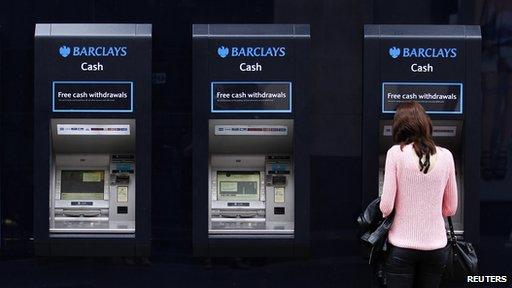Fraud from stolen bank cards highest since 2006
- Published

Customers are being distracted while using cash points, says the UK Cards Association
Consumers are being warned about a series of bank card scams, after fraud from stolen cards rose to its highest level in eight years.
Cards that were lost or stolen in the UK resulted in losses of £58.9m last year, the largest figure since 2006.
Losses from all types of card fraud rose by 16% in 2013, to £450m.
The UK Cards Association, which produced the figures, highlighted "distraction" thefts of cards as a particular problem.
It warned that consumers are frequently being targeted while using their cards in shops or bars, or at cash points.
Typically they will have a bit of paper thrust in front of them, asking for directions.
While they are distracted, the criminal will steal their card.
Sometimes the theft is so quick that consumers will think the cash point has swallowed the card.
"Vishing"
The largest rise was in telephone and internet fraud.
It rose by 22% last year, to £301.1m, and now represents three-quarters of all card fraud.
One reason, said the UK Cards Association, was the huge growth in online shopping, with the UK now Europe's leading online retail economy.
It said enhanced Chip and PIN security was forcing criminals to change tactics.
Consumers are increasingly being tricked into handing over bank account details, as a result of so-called "vishing" attacks.
Fraudsters telephone consumers, telling them a suspicious payment has been made from their account.
Even though many people put the phone down, and call their bank back, the fraudsters often stay on the line.
Since consumers think they are talking to their bank, they frequently give away passwords or PINs.
In cases of so-called "courier fraud", the criminals send a courier round to the victim's address to pick up their cards.
Total card fraud still amounts to less than it did in 2008, when £609m was lost.
- Published26 January 2014
- Published6 January 2014
- Published16 May 2013